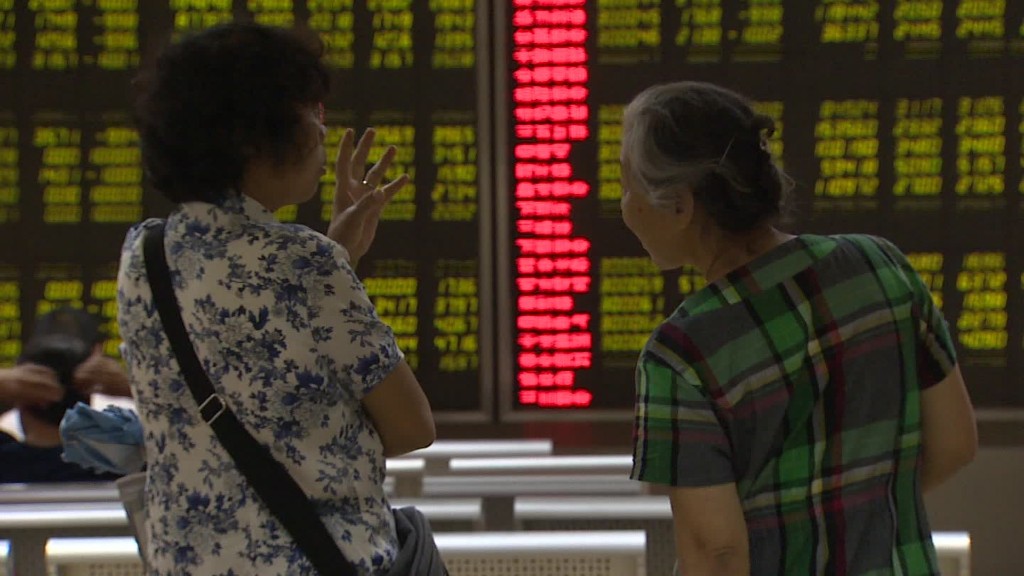Traders pull $1 trillion from rising marketplaces in a 12 months

Chinese buyers pull out of the stock market
Investors are unable to get their income out of emerging markets rapidly adequate.
Cash has been pouring out of developing economies at a more rapidly tempo, and for lengthier, than during worldwide economic crisis of 2008 and 2009, in accordance to information from NN Investment decision Associates, an asset supervisor based in the Netherlands.
About one trillion dollars has been withdrawn because July 2014, double the quantity that fled during the nine months to March 2009, it mentioned.
The triggers? China just isn’t buying as several commodities as it once did, and the world is awash with oil — hurting exporters . The chance that U.S. desire costs could increase this calendar year is also sucking money out of riskier markets.
The Russian financial system is tanking , Brazil is on the ropes, and Kazakhstan was just compelled to devalue its forex by practically 25%.

More than $ fifty two billion fled Russia in the initial 50 percent of 2015, on leading of $ a hundred and fifty billion last year, formal data show. Brazil noticed $ forty eight billion flee in the first 50 %. Economists say China as well has endured outflows, but the actual figures are not identified.
Traders are now backpedaling rapidly right after pouring close to two trillion bucks into rising markets in between 2009 and 2014 in the lookup of better returns than the zero interest prices on offer in several developed economies.
If the situation sounds familiar, that is because it is. Many emerging markets received burnt by a equivalent collapse just a handful of several years ago. They observed a massive influx of money in 2006 and 2007, adopted by crushing outflows in 2008 and 2009. That rollercoaster trip still left a lot of governments in disaster, unable to get handle.
So, was absolutely nothing realized from the last crisis? Indeed and no.
Most governments in rising markets have handed reforms that should partly defend them from disaster — a lot of have abandoned set trade rates, and minimize down on borrowing in foreign currencies.
But even though governments curbed their exposure to dollar debt, rising market organizations didn’t. In fact, analysts at NN Expenditure level to “too much credit expansion given that the Lehman crisis, specifically in China.”
This enormous foreign borrowing was inspired by central financial institution stimulus in the U.S., Europe and Japan that manufactured cash really inexpensive.
But with the Fed now signaling its first charge boost in practically a decade could arrive shortly, possibly as quickly as September, the predicament is shifting.
And then there is oil. Rising marketplaces, these kinds of as Russia, Venezuela , and Brazil count on oil exports. But prices have been tumbling given that previous summer, and dropped once more Monday .
The modern turmoil in China helps make a lot of query the strength of economic progress in the world’s second biggest economic climate. China has grow to be an even far more crucial player in the worldwide economic system since the final disaster, which means its troubles now have considerably wider implications.
China’s selection to devalue the yuan is fueling the flight.
The devaluation prompted Chinese corporations to dig into currency reserves to repay overseas credit card debt, fairly than threat the price of the loans rising if the yuan fell even more.
Money outflows have pushed many emerging marketplaces currencies down. The Turkish lira, Colombian peso, Brazilian true, India rupee, and Russian ruble are between the largest losers, but numerous other people have suffered too. Countries are getting forced to elevate curiosity rates or dig deep into reserves to consider to protect them.
Yuan devaluation is small vs. spectacular drops in euro, yen and ruble
